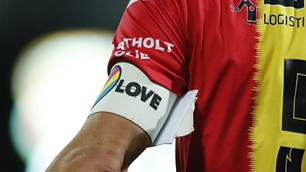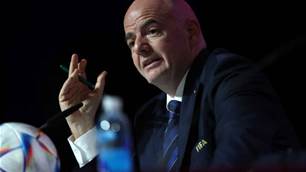FIFA will reject calls for goal-line technology to be introduced despite the controversy over Frank Lampard's disallowed strike.
Had the goal been given in today's last-16 match, England would have drawn level at 2-2 with Germany - they eventually tumbled out of the World Cup 4-1 in humiliating fashion.
Sports minister Hugh Robertson today called on FIFA to change their stance - they ruled out goal-line technology at the International FA Board meeting in March in favour of experiments with two extra assistant referees.
Robertson said: "This was a disappointing end to a tournament in which England hardly ever performed.
"Once the dust has settled, I hope the FA take a long hard look at the reasons why, and FIFA reassess their opposition to using goal-line technology."
FIFA refused to comment after the match, saying: "FIFA will not make any comment on the decisions of the referee on the field of play."
However FIFA secretary general Jerome Valcke said only yesterday: "We can talk about refereeing decisions which, when you looked at them after the game, you could say were perhaps not good decisions. We didn't say you could have a zero-fault system in the World Cup.
"Additional assistants [behind each goal-line] could happen in 2014 to make sure these kind of things are not happening in refereeing.
"It doesn't mean the use of video, that is definitely not on the table today, but one thing we are discussing is two additional assistants to support referees to make decision-making easier and to have more eyes helping him to make such decisions.
"We knew this is where criticism would come."
After the IFAB meeting in March, Valcke admitted he feared just such a controversy in this World Cup.
Valcke said then: "Questions will always come, we just hope they will not come in the final of the World Cup."
FIFA president Sepp Blatter has also defended their position, saying: "No matter which technology is applied, at the end of the day a decision will have to be taken by a human being. This being the case, why remove the responsibility from the referee to give it to someone else?
"It is often the case that, even after a slow-motion replay, 10 different experts will have 10 different opinions on what the decision should have been.
"Fans love to debate any given incident in a game. It is part of the human nature of our sport."
Gordon Smith, the ex-chief executive of the Scottish FA who had proposed a new look at technology, said he did not think the Lampard incident would persuade FIFA to change their minds.
Smith told Press Association Sport: "It was not significant to the result but even if it had been I don't think they would change their minds.
"I'm sure FIFA were relieved it was not 2-1 as it would have been a major issue and talking point.
"Everyone watching at home saw what happened and these situations will arise again in the future but I don't think they'll change it."
Paul Hawkins, the managing director of the company Hawk-Eye which has developed goal-line technology, said FIFA should now rethink.
Hawkins said: "It did take a series of poor line calls in the 2004 US Open as the catalyst for change for electronic line calling in tennis.
"If this incident is the same catalyst in football, then whilst it is disappointing that FIFA have been reactive rather than proactive, at least football will change for the better in the long run.
"If you look at a large set of close goal-line incidents, many of them only go over the line for a fraction of a second, and no human is able to fairly officiate these incidents regardless of where you are standing.
"Maybe in 1966 when broadcast technology was far inferior, it was interesting to debate if it was or was not a goal.
"Things have moved on since then, and the only debate following this incident will be, 'Why don't the governing bodies do something about this?'"
Related Articles

Morocco blazing a trail for Arab women's football participation

FIFA blasted for OneLove armband threat













